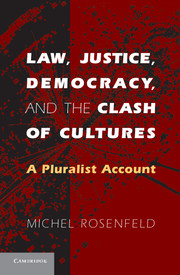Introduction
Published online by Cambridge University Press: 05 June 2012
Summary
The clash of ideologies that dominated the era of the Cold War has given way to a clash of identities. At the highest levels of abstraction, the Cold War conflict between liberal capitalism and Marxist communism, as fierce and ideologically charged as it was, was one among two contenders that were equally anchored in the legacy of the Enlightenment and equally committed to universalism. In a nutshell, the project of the Enlightenment consists in adherence to the rule of reason and to promotion of equal liberty for all, and both liberal capitalism and Marxist communism have been ideologically aligned with this project though their respective interpretations of its key terms were, to be sure, widely divergent.
Liberal capitalism and Marxist communism appeal to reason and eschew metaphysical claims, and though their conceptions of liberty and equality are in conflict, they both adhere to the view that every human being is ultimately inherently equal to every other human being and that all human beings are equally entitled to liberty. Moreover, whereas liberal capitalism may be strongly committed to negative liberty and Marxist communism dependent on positive liberty to be fully realized through the revolution of the proletariat, and whereas these two ideologies may greatly diverge along the spectrum that extends from purely formal equality to full material equality, they both fully coincide in their universalism.
- Type
- Chapter
- Information
- Law, Justice, Democracy, and the Clash of CulturesA Pluralist Account, pp. 1 - 20Publisher: Cambridge University PressPrint publication year: 2011



